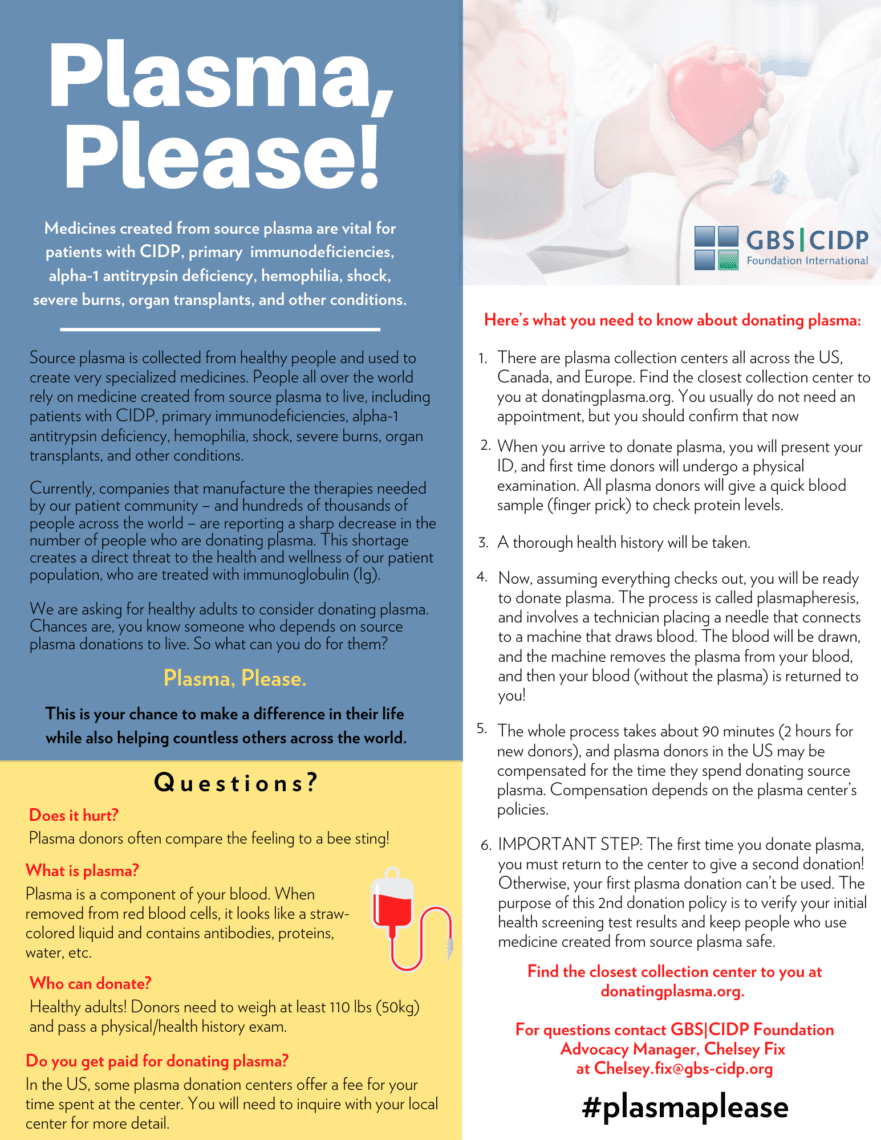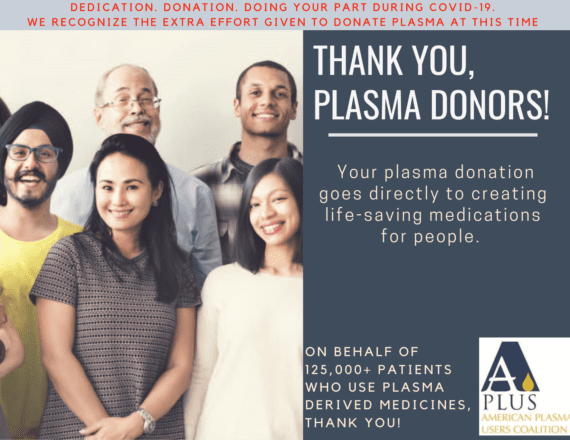Plasma is the straw-colored liquid portion of blood that contains proteins that are essential for the human body, including antibodies and clotting factors. Antibodies (also known as immunoglobulins) play an important role in health and illness. Many patients living with CIDP, MMN or Variants regularly receive intravenous immunoglobulin (IVIG) subcutaneous immunoglobulin (SCIG) to treat the condition, and many GBS patients likely received IVIG after diagnosis. Flooding a person’s system with antibodies from normal, healthy individuals can reverse problems caused by abnormally overactive immune systems.
Immunoglobulin -whether given as IVIG or SCIG – is created from source plasma that is donated from healthy people. There is no other way to create this treatment, so patients who use plasma products rely on people to donate plasma through a safe, relatively quick process for which their time may be reimbursed.
Currently, companies that manufacture the therapies needed by our patient community – and hundreds of thousands of people across the world – are reporting a sharp decrease in the number of people who are donating plasma. This shortage creates a direct threat to the health and wellness of our patient population, who are treated with immunoglobulin (Ig). Ig can only be created from human plasma donations, therefore, we are asking for plasma, please.
If you are a patient living with CIDP, MMN, or a variant or you once had GBS, we are asking that you share information about how to donate plasma with loved ones in your life to help inspire them. Plasma donors are everyday heroes that selflessly give plasma so that others can live.
A quick reminder that immunoglobulins come from source plasma donations. Many people have heard recently about convalescent plasma as a potential treatment for Covid-19. Learn more about the difference in this article by Dr. David Saperstein.
Information About Donating Plasma
- Find a plasma donation center near you: https://www.donatingplasma.org/donation/find-a-donor-center
- Who can donate plasma: adults over 18 years old who weigh at least 110 pounds (50kg). All people interested in donating must pass two medical exams, a medical history screening, and be tested for transmissible viruses (such as HIV or hepatitis C).
- How long does it take: The first time someone donates plasma, they spend about 2 hours going through the process. Each visit after that take about 90 minutes. People who donate plasma may be compensated for their time in the US.
- Does it hurt: Plasma donors compare the sensation to a bee sting. Plasma is collected through a process called plasmapharesis, which involves a needle placed into a vein that draws blood. The blood is then processed through a machine that separates the blood cells from the plasma, and the blood is returned to the donor’s body.

On behalf of the hundreds of thousands of patients across the world who use plasma, Thank You.
FAQs about Donating Plasma
Can IVIG be made from whole blood donation as well or just plasma? Recovered plasma, obtained from a whole blood donation, is a suitable raw material for the manufacture of IVIGs. There just isn’t enough of it! The world cannot depend on recovered plasma to meet patients’ clinical needs.
Can you donate plasma if you’ve had GBS, or other autoimmune conditions? If a U.S. source plasma center is EU certified, the deferral would be automatic. EU requires deferral of donors who have neurological conditions or a recurring or relapsing disease or condition. In the U.S., however, the regulations/guidances are not so black and white. However, many would be deferred either because of the condition itself or medications being taken for the condition or general physical condition at the time of the interview or physical examination. For the most part, individual company policies dictate.
Can I donate plasma or blood for Covid-19 research if I am using SCig? People receiving antibody therapies should not donate. There is not a concern for product safety, but rather for the health and well-being of the person wanting to donate. It would be impossible to monitor the effectiveness of a person’s antibody treatments if they were also donating antibodies.
What type of safety measures are donation centers taking during Covid-19? Donation centers have implemented safety protocols that include sanitation of facilities and equipment, mask wearing and other PPE measures, and social distancing.
Related Plasma Articles
- APLUS Statement on the State of PlasmaAugust 5, 2020
- Wrap Up With A Win – Awareness Month’s Advocacy Week Brings Legislative VictoriesMay 14, 2020
- What is Convalescent Plasma?April 14, 2020
- Global Plasma Leaders Collaborate to Accelerate Development of Potential COVID-19 Hyperimmune TherapyApril 6, 2020
- Work Continues for CSL Behring During the PandemicApril 2, 2020

